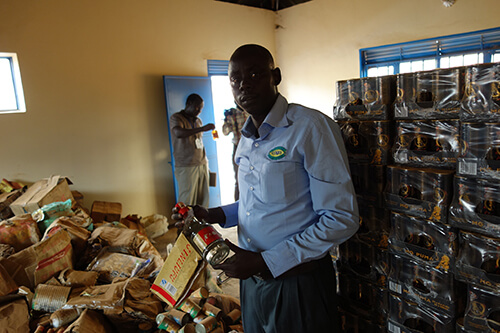The biscuits came from Iran in modern, airtight packaging, the list of ingredients displayed on the back, an appetizing picture of the snack on the front.

The problem was that their expiry date was the week before they crossed the border from Uganda.
They were inedible, potentially harmful for the consumer, and duly rejected by South Sudan’s embryonic National Bureau of Standards (SSNBS).
“There was a whole consignment like this,” says Jacob Matiop, SSNBS head at Nimule, through which 90% of the nation’s goods arrive through the East African Community’s Northern Corridor from the Kenyan port of Mombasa.
“So we seized them, and we will destroy them. The owners are upset but South Sudan will not let itself become a dumping ground for sub-standard or expired goods of any sort, and that means everything from biscuits to computers.”
Matiop is young, determined and enthusiastic about establishing a system of standards of the sort that many EAC states already have or are, like his own country, building with help from TradeMark Africa (TMA) to protect consumers and streamline trade.
“Of course traders get upset. They are not used to the idea of standards. One trader even pulled a pistol on one of my officers but we are protecting our young nation and our consumers. It is a duty.”
Standards are a key part of the harmonization of goods traded within the EAC and a vital part of TMA backed programmes to streamline trade, cut the cost of doing business and bring down costs for consumers.
“Just the other day we intercepted a whole container of expired maize meal destined for our army,” says Matiop, with indignation. “Imagine!”
He acknowledges that it is an uphill task in the world’s newest nation and one that has been at war for nearly 30 years until independence from the Khartoum government in the north in 2011.
“People do not realize that we are trying to protect them. They are used to buying what is in the market but we are saying that what is sold has to be of acceptable standard and that means everything,” Matiop says.
The modernisation of the SSNBS includes: training in English- the lingua franca of East African trade- for its largely Arabic-speaking staff, technical assistance, help with weighing and laboratory testing and links to other EAC bureaus of standards for guidance and ideas.
Proof of the success of the SSNBS programme is heaped in piles in an adjacent warehouse. Along one wall are a stack of computers, screens and keyboards “that were rejected everywhere else but ended up coming here,” he says.
An entire consignment of a fashionable high-energy drink occupies one corner. “It arrived with only a few weeks left before it expired. So we seized it. We are not going to compromise on these matters.”
Teaching the young nation’s consumers about standards is as hard as educating traders that South Sudan is no longer an easy touch for second-rate trade, he says.
“We have programmes on television on radio and in the press. Our consumers have to learn to raise their own standards,” he says.
The determination to establish high standards is mirrored in smart new offices in Nimule, light blue easily-recognisable uniforms with the SSNBS logo and rooms readied to receive laboratory and metrology equipment to be partly funded by TMA.
The SSNBS programme is not confined to imports. It has started a programme of visits to retail outlets, bakeries and bottled water companies to set and maintain standards and get consumers used to getting the best.
That programme was assisted by the Kenya Bureau of Standards (KEBS), a TMA partner with up-to-date laboratories financed from TMA funds.
“We are building from ground zero,” says SSNBS Mary Gordon Muortat, Executive Director in her Juba office. “But we shall succeed.”
















Sounds similar to the imported Digestive biscuits I see sprawled all over several major supermarkets in Nairobi, with a ‘buy one get one free’ offer. Turns out, they expire in September – or there abouts. I don’t know what the time cap is for a product to qualify as dumped, but these biscuits sure have the classic signs.
Great story, I am glad to see the young nation standing up for quality products for its citizens, by no means should anyone accept low quality products because it is the “norm” to accept such in Africa. It is also encouraging to have KEBs assist in this exercise, a regional country, partnering to give home grown solutions to the regional problems.